
Democratic presidential candidate and former Vice President Joe Biden, his wife Jill Biden, US Senator Kamala Harris (D-CA) and her husband Douglas Emhoff are pictured after Harris accepted the Democratic vice presidential nomination during an acceptance speech delivered for the largely virtual 2020 Democratic National Convention from the Chase Center in Wilmington, Delaware, US., August 19, 2020. [Reuters]
The US Democratic Party’s nomination of California Senator Kamala Harris as Joe Biden’s running mate for the November presidential elections is a major step for the country. As the first major vice presidential candidate of African and Indian descent that the US has ever seen, the pair are making history in their bid for the nation’s highest office.